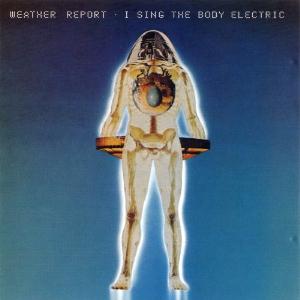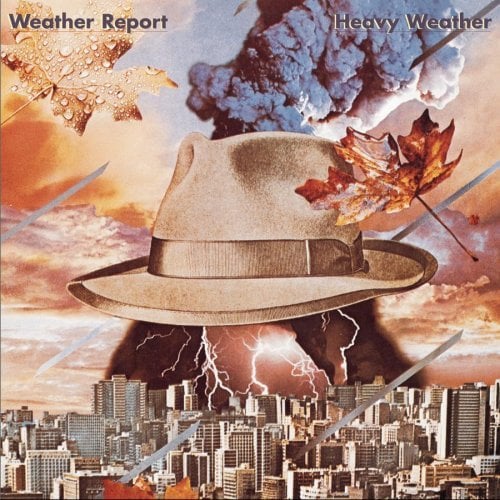I have been digging out my collection of LPs recently, and realised that I own six Weather Report LPs. So I thought I'd do a series of mini-reviews, taking them in chronological order. This is not a comprehensive review of all their albums, only those which I have on vinyl. (I also have one on cassette somewhere. Remember home taping killed music, kids.)
Listening to them it seems the main story arc is the evolution of Zawinul's keys, and their ever-expanding role. At the beginning, he plays a Rhodes electric piano through distortion and wah-wah effects to achieve sharp jabbing chords during improvised sections, or shimmering textures. He plays the effects as much as the keyboard. He's got an organ too but he still plays acoustic piano a lot. Then the mix of keyboards changes by mid-70s when he gets his first monophonic synthesiser, the ARP 2600 (in fact he often played two of them). It's not until 1976 when he got his first polyphonic synthesier made by Oberheim. By the late 70s he still hadn't gone completely electronic, and plays acoustic piano still. He managed that only by 1984. It seems to me that Zawinul was hankering after the expressiveness of a horn.
Wayne Shorter's role seems to be one of a bystander most of the time, but one ready to chip in with some trenchant remark when he sees fit. His playing style on tenor doesn't change much; then again he sticks with soprano mostly. That must be because it cuts through amplified instruments better than a tenor, which gets lost in the mid-range.
So the first LP on the turntable is I Sing the Body Electric.

This LP is programmed in two halves (no shit...). Side 1 comprises four studio tracks recorded in New York City in late 1971 and early 1972; side 2 comprises a selection of tracks from a live session in Tokyo, recorded in January 1972. I bought this LP years ago and wasn't ready for the harshness of the band; it's not helped by the crappy quality of the NYC studio tracks. There's none of the gloss that attracted me to their music, and which came later. Those side 1 tracks are impressionistic but variable quality. The Moors is fine, thanks to the Ralph Towner intro, and Unknown Soldier has its moments, though it's too blatant an "anti-war" piece. Side 2 is the better of the two, by far; this was one kicking live band. Listening to it now I can hear the resemblance to the late Miles quintets (Chick Corea on Rhodes, Dave Holland on acoustic bass). Miroslav Vitous is on fine form here.



Listen to this example:
Listening to them it seems the main story arc is the evolution of Zawinul's keys, and their ever-expanding role. At the beginning, he plays a Rhodes electric piano through distortion and wah-wah effects to achieve sharp jabbing chords during improvised sections, or shimmering textures. He plays the effects as much as the keyboard. He's got an organ too but he still plays acoustic piano a lot. Then the mix of keyboards changes by mid-70s when he gets his first monophonic synthesiser, the ARP 2600 (in fact he often played two of them). It's not until 1976 when he got his first polyphonic synthesier made by Oberheim. By the late 70s he still hadn't gone completely electronic, and plays acoustic piano still. He managed that only by 1984. It seems to me that Zawinul was hankering after the expressiveness of a horn.
Wayne Shorter's role seems to be one of a bystander most of the time, but one ready to chip in with some trenchant remark when he sees fit. His playing style on tenor doesn't change much; then again he sticks with soprano mostly. That must be because it cuts through amplified instruments better than a tenor, which gets lost in the mid-range.
So the first LP on the turntable is I Sing the Body Electric.
This LP is programmed in two halves (no shit...). Side 1 comprises four studio tracks recorded in New York City in late 1971 and early 1972; side 2 comprises a selection of tracks from a live session in Tokyo, recorded in January 1972. I bought this LP years ago and wasn't ready for the harshness of the band; it's not helped by the crappy quality of the NYC studio tracks. There's none of the gloss that attracted me to their music, and which came later. Those side 1 tracks are impressionistic but variable quality. The Moors is fine, thanks to the Ralph Towner intro, and Unknown Soldier has its moments, though it's too blatant an "anti-war" piece. Side 2 is the better of the two, by far; this was one kicking live band. Listening to it now I can hear the resemblance to the late Miles quintets (Chick Corea on Rhodes, Dave Holland on acoustic bass). Miroslav Vitous is on fine form here.



Listen to this example:







 and a
and a 






Comment